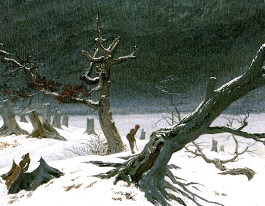Briar and fennel and chinquapin,
And rue and ragweed everywhere;
The field seemed sick as a soul with sin,
Or dead of an old despair,
Born of an ancient care.
The cricket’s cry and the locust’s whirr,
And the note of a bird’s distress,
With the rasping sound of a grasshopper,
Clung to the loneliness
Like burrs to a ragged dress.
So sad the field, so waste the ground,
So curst with an old despair,
A woodchuck’s burrow, a blind mole’s mound,
And a chipmunk’s stony lair,
Seemed more than it could bear.
So solemn too, so more than sad,
So droning-lone with bees—
I wondered what more could Nature add
To the sum of its miseries
And then I saw the trees.
Skeletons gaunt, that gnarled the place,
Twisted and torn they rose,
The tortured bones of a perished race
Of monsters no mortal knows.
They startled the mind’s repose.
And a man stood there, as still as moss,
A lichen form that stared;
And an old blind hound, that seemed at loss,
Forever around him fared
With a snarling fang half-bared.
I looked at the man. I saw him plain.
Like a dead weed, gray and wan,
Or a breath of dust. —I looked again—
And man and dog were gone—
Like wisps o’ the graying dawn.…
Were they a part of the grim death there?—
Ragweed, fennel, and rue?—
Or forms of the mind, an old despair,
That there into semblance grew
Out of the grief I knew?
 Madison J. Cawein (March 23, 1865-December 8, 1914) was a prolific Kentucky poet who authored over 30 volumes of poetry, many of which concern nature and mythology. The poem ‘Wasteland’ originally appeared in the 1912 edition of THE REVELATOR, and was subsequently reprinted in Cawein’s 1913 book Minions of the Moon, a poetry collection focused on the fantastic and the faery. The poem’s appearance in the January 1913 edition of Poetry magazine (as ‘Waste Land’), under the editorship of Ezra Pound, is now considered an influence on the imagery found in T. S. Eliot’s poem, “The Waste Land.” Astute readers of THE REVELATOR will rightly suspect that we have reprinted the poem in this issue in honor of Richard Bowes, and his 1998 novel Minions of the Moon.
Madison J. Cawein (March 23, 1865-December 8, 1914) was a prolific Kentucky poet who authored over 30 volumes of poetry, many of which concern nature and mythology. The poem ‘Wasteland’ originally appeared in the 1912 edition of THE REVELATOR, and was subsequently reprinted in Cawein’s 1913 book Minions of the Moon, a poetry collection focused on the fantastic and the faery. The poem’s appearance in the January 1913 edition of Poetry magazine (as ‘Waste Land’), under the editorship of Ezra Pound, is now considered an influence on the imagery found in T. S. Eliot’s poem, “The Waste Land.” Astute readers of THE REVELATOR will rightly suspect that we have reprinted the poem in this issue in honor of Richard Bowes, and his 1998 novel Minions of the Moon.

You must be logged in to post a comment.